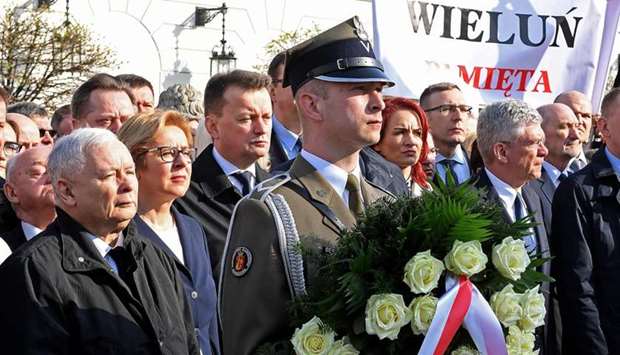Poland's President Andrzej Duda on Tuesday demanded that Russia hand over the wreckage of a 2010 presidential plane crash that has stoked friction with Moscow and divisions at home as Warsaw marked eight years since the disaster.
President Lech Kaczynski and his wife Maria were among the 96 people who died in the crash in Smolensk, western Russia, on April 10, 2010.
Poland's governing rightwing Law and Justice (PiS) party, led by Kaczynski's twin brother Jaroslaw, has long insisted the crash was no accident, with a new probe suggesting it was triggered by an explosion.
The previous liberal government blamed bad weather and errors by the Polish pilots and two Russian air traffic controllers for the crash, regarded by some as Poland's worst post-war disaster.
"The plane wreckage is probably the most important evidence in this case -- it's still in Russia and the Russian authorities don't want to hand it over," Duda told Polish media.
"One can only ask why the Russians don't want to return the wreck," he added, after laying floral tributes on the graves of Kaczynski and his wife in the southern Polish city of Krakow.
Warsaw has repeatedly asked Moscow to hand over the wreckage and black boxes, but each time Russia has said it will only do so when its own inquiry is finished.
Ties have been strained since the crash, and also since Moscow's 2014 annexation of Crimea from Ukraine, as well as the recent spy poisoning row that prompted a string of tit-for-tat diplomatic expulsions between Russia and the West.
Unite, not divide
Later on Tuesday, Duda called for unity among Poles as he unveiled a controversial monument to the victims of the crash in the capital Warsaw.
"I believe that this monument will unite us, regardless of our views, regardless of political stripes or beliefs; it belongs to everyone and is for everyone," Duda told several thousand people gathered in the square for the unveiling.
Known for his highly divisive us-against-them brand of politics, Jaroslaw Kaczynski used the ceremonies to call for "the unity of all Poles" at a time when the opinion poll ratings of his governing PiS party are plunging, amid public outcry over generous bonuses for its ministers.
The monument's location on an historic central Warsaw square adjacent to Poland's Tomb of the Unknown Soldier has also triggered tensions, and a thick cordon of police blocked protesters in a nearby park as the monument was unveiled.
The triangular black granite monument resembling the tail wing of an airplane as well as airplane stairs is inscribed with the names of the crash victims.
They include senior Polish statesmen and politicians of various stripes who had been heading to a ceremony in Russia's Katyn forest in memory of thousands of Polish army officers killed by Soviet secret police in 1940 -- a massacre the Kremlin denied until 1990.
Explosion?
Poles are divided over the causes behind the crash.
Some 57 percent of believe it was an accident, while 20 percent think it was an attack, according to a survey published Tuesday by the Super Express tabloid daily. Twenty-three percent have no opinion.
In 2015, Polish prosecutors charged one of the Russian air traffic controllers with "being directly responsible for having endangered air traffic" and the other with "unintentionally causing an air traffic disaster".
Having rejected as a cover-up the conclusions of the earlier investigation that put the blame on human error and bad weather, the PiS government launched its own probe using new investigators.
They suggested last year that an explosion was likely to have caused the aircraft to break up in the air.
Polish justice officials have also exhumed the remains of the victims to test for traces of explosives or combustion.
A defence ministry sub-committee is due to present the partial findings of the new probe on Wednesday in Warsaw.

